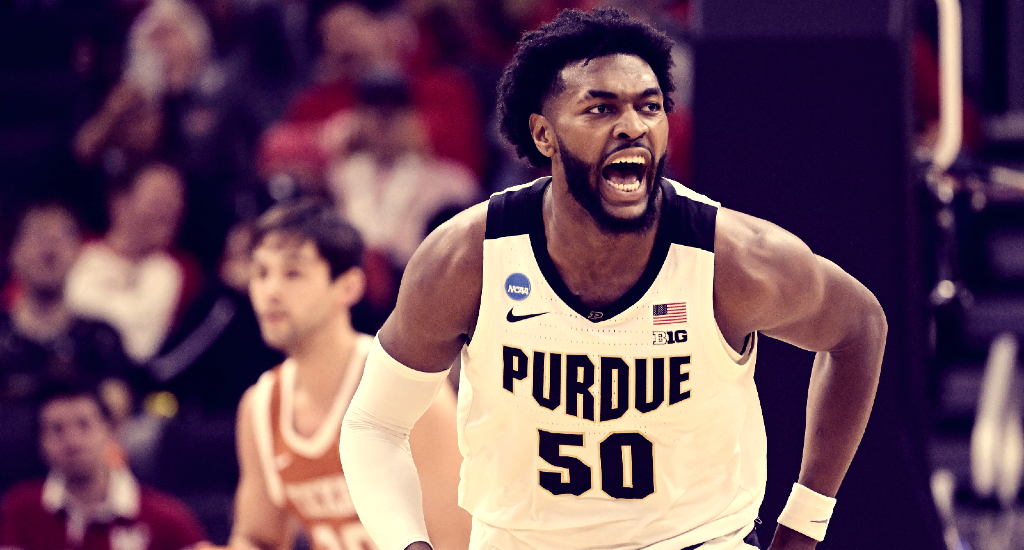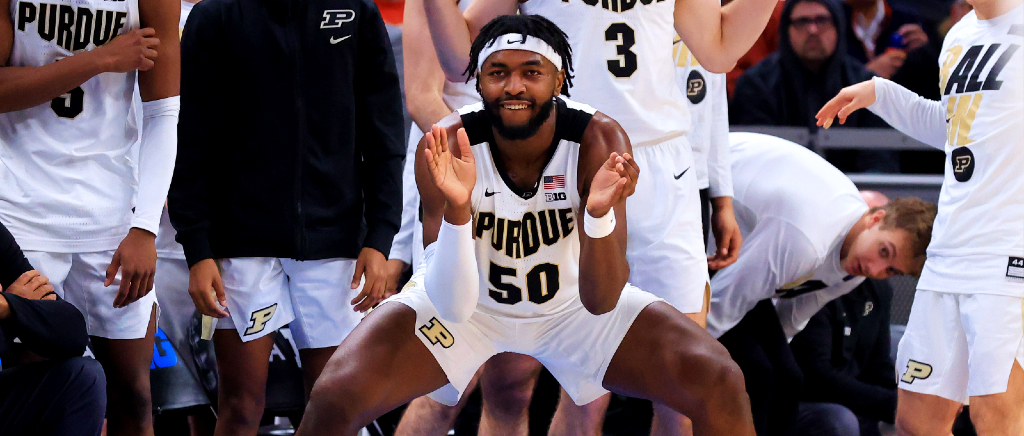The word “joy” gets thrown around a lot when Trevion Williams talks. It’s probably not a huge surprise to those who have watched him at Purdue, as Williams, a projected second-round selection in the 2022 NBA Draft, boasts one of the more unique games of any big man to come into the league in recent years. When he’s not on the floor, he’s standing on the sideline, expressive as anyone in the country in an effort to be, as he tells Dime, “our number one cheerleader on the bench.”
Still, anyone who has ever had a conversation with another person has run into the situation I found myself in while Williams and I spoke over Zoom last week. Similar words and themes — joy, happiness, positivity, etc. — popped up several times within the first minute or so of our conversation, which made me ask about Williams’ efforts to experience joy in every situation.
“It definitely has a lot to do with my personality,” Williams says. “I’m a pass-first guy, so anytime I can get other guys involved, I’ll do so. I thrive off seeing other guys succeed and I’m always the guy that put others before myself, and I think it has a lot to do with how I was raised and how I was brought up. My family, my mom most importantly, has always taught me to be unselfish. And I think that translates over, on and off the court, just me as a person.”
Family is another thing that comes up over and over again. At every opportunity, Williams stresses the role that his loved ones played in shaping who he is today.
He was told over and over again that he had special gifts, that he was unlike everyone else. His parents hammered home the importance of not being one-dimensional, while his support system provided him with endless, unconditional love. From a young age, Williams’ uncle Ty stressed that his dreams would change the family, and that the things that he would go on to achieve would have a bigger impact than what anyone else would achieve.
In 2015, Ty lost his life to gun violence in Chicago. Williams, who was born and raised in the city, felt that these sorts of senseless acts of violence pushed him away from the Windy City. Every summer, Williams would spend time with one of his uncles, and after Ty passed away, he traveled to Michigan to visit his uncle Curtis, the principal at the Henry Ford Academy School for Creative Studies in Detroit.
At the time, Williams and his mother, Shawndra Lewis, were living with his grandmother. He remembers calling her and saying he felt safe at the school, and it would give him the chance to grow as a basketball player, student, and person. Williams would end up transferring, and while he went to school, Shawndra held jobs in Chicago and Detroit, driving back and forth between the two cities every week.
“Basically going from check-to-check, trying to provide and help my uncle Curtis out with me,” Williams says. “That speaks volumes to how she is as a person, she wanted me to follow my dreams, so did my uncles and everybody else in my family, they wanted me to be successful with this. They always told me growing up, you’re meant for this lifestyle, and were gonna do everything in their power to make sure I was okay.”
Williams didn’t want to go to the kind of high school powerhouse that churns out high-level recruits. To him, as long as he could play basketball — even if it was at a smaller art school that had students from sixth to 12th grade roaming the hall every day — he was going to be happy. The success on the court was always going to come, with Williams averaging more than 20 points and 20 rebounds a game as a junior and senior while earning a 4-star distinction. When it came time to pick a college, Williams fell in love with the family environment that Matt Painter fosters at Purdue, which had the bonus of being a little more than two hours away from his loved ones in Chicago.

As a talented big man who struggled with his weight — he arrived in West Lafayette weighing 325 pounds — Williams struck up “a really good relationship” during the recruiting process with the late Caleb Swanigan, who passed away shortly after Trevion and I spoke. Williams saw the way that the Boilermakers were able to transform him into an NBA Draft pick and one of the most uniquely skilled big men in the country.
“A lot of the recruiting process for me with Purdue pertained to Biggie, his process and becoming a player that he was, and then just watching what they did with him, and reading about him, and doing research, and all this stuff,” Williams says. “He’s told me about his struggles, and I found similarities within myself. I had some of those same struggles — growing up, I was always talented, but always had that weight that held me back from being such a special player, which I feel like I’ve grown to be. But I could have been even better if I didn’t have those struggles, but you appreciate things like that.
He had a huge impact on my decision. Like I said, watching what they did with him, watching what they did with his body, his process, his journey on making it to the NBA when he had people tell him that he wasn’t good enough, how was he going to fit. That’s kind of where those similarities come in, that’s what drives me every day, people telling me what I can’t do, because I’m more than capable of doing things if I work on it, if I put time into it.”
Williams put the time into getting his body right and thrived. He appeared in all but two games as a true freshman, and in each of his final three years, Williams was asked to shoulder one of the heaviest workloads in the sport. Per KenPom, Williams was 38th in the country in percentage of possessions used as a sophomore, second as a junior, and 11th as a senior. When he was on the floor, Painter and co. trusted him to serve as the hub for the the Boilermaker offense.
“Adjusting to Purdue’s system was fairly easy,” Williams says, “they threw the ball in, and I knew I was going to touch it.”
It paid off his junior year, when Williams earned first-team All-Big Ten honors. He started all but two games in which he appeared, tested the NBA Draft waters, and decided to come back. And then, as a senior and someone who established himself as one of the best players in the country, Williams was asked to come off the bench.
While it’s not an easy pill to swallow, Williams understood that the needs of the team were the most important thing, and found a way to use this unique situation as a form of motivation en route to a third-team All-Conference selection, getting named the Big Ten’s Sixth Man of the Year, and playing a major role in the Boilermakers making it to the Sweet 16.
“Having that mindset of always trying to figure it out, man, it’s helped me so much,” he says. “Obviously, it was tough, because you always have questions about why things are the way they are. I just trusted myself, coach making that transition forced me to open up as a person, it’s forced me to be more vocal, not be that quiet guy anymore, just forced me to be that cheerleader on the bench, standing next to coach, we’re down 10 and we need some positivity and some energy, I’m that guy. So I figured out other ways, and man, it’s been a blessing to have gone through what I’ve been through.”
The fact that he’s on the verge of getting to the NBA, he says, hasn’t hit him yet. Williams is wired to block out noise, focus on what he has to do during the pre-draft process, and trust that the thing that will happen is what is meant to happen. He’s filling that time in hotel rooms across the country, in cities he has never visited before like Charlotte and Los Angeles, by making music — Williams grew up in the church and has “been in choir pretty much my whole life.” He views singing as a way to achieve peace when he’s away from the hardwood.
When he does step on the floor, Williams wants to find joy in being the best player he can be.
“What’s your work,” he asks, “if you can’t have fun with it? I would tell my teammates in college, high school, whatever team I was a part of, anytime I spoke up, they tell you I say, just have fun,” he says. “That’s what it’s about, man, being a part of a team, building a brotherhood, just going through, knowing that guys next to you want success just as bad as you do. It’s a great feeling. It’s about just being a part of something for me.”
NBA teams have told him in the pre-draft process in each of the last two years that they want to see him become more comfortable shooting the ball, and while he agrees that he has room to improve and is spending time in the gym working on this, Williams believes he is better than he was a year ago.
They are, however, enamored with his ability to pass the ball. From the time he was in high school, he’s always preferred making the game-winning pass as opposed to hitting the game-winning shot. It goes back to his upbringing, where the importance of putting others before himself was instilled in him from a young age. As a result, Williams says, his first objective when he gets the ball is to look for the open guy before he tries to score. If you’ve made it this far into this piece, you will not be surprised which specific word he used to describe what he feels when his passing leads to a teammate scoring.
“I’ve always just found joy in seeing other guys succeed,” Williams says. “It plays a huge part in my personality, it’s not about me, and so I try to get other people involved as much as I can, and I really thrive off of it. I sound like a broken record, but, man, I guess I really enjoy seeing other guys succeed, because it helps me succeed. Just knowing that I put guys in that position, I’m able to impact somebody. It does a lot for me.”
We’ll learn on Thursday night what basketball has in store for Williams. But one thing is for sure: Wherever he ends up, he’ll do whatever he can to bring his infectious sense of joy to anyone and everyone around him.







